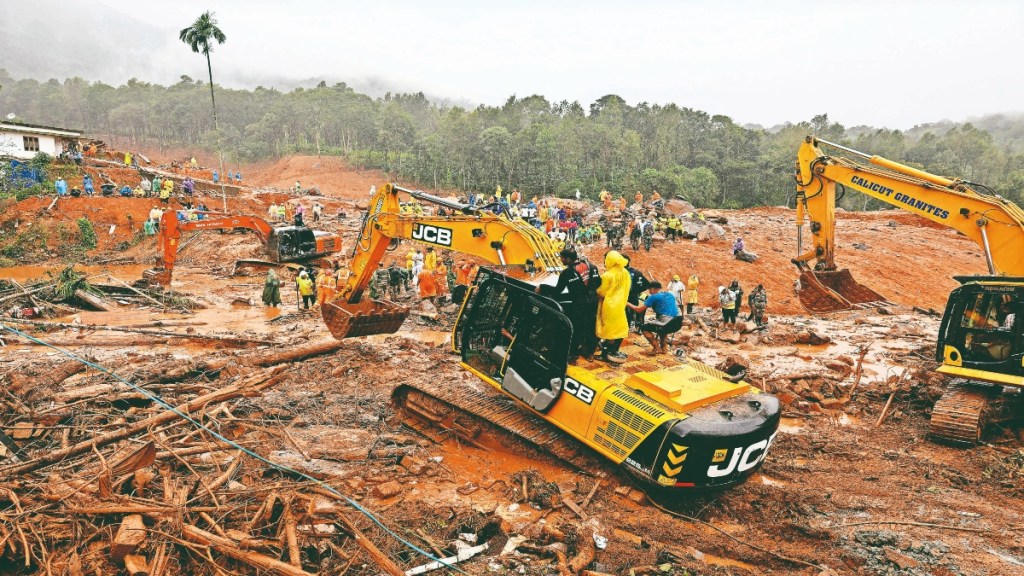For Nanak Chand, a retired Himachal Roadways employee in his 60s, July 11, 2023, was the worst day of his life. “The stuff of nightmares,” he calls it.
It had been raining for days, says Chand, a resident of Jabli village in Himachal Pradesh’s Solan district. There was news of landslides and floods all around following a cloudburst, even as cracks started appearing on some houses in the village. He had been away for a few days to take care of a sick relative who had been hospitalised.
Then, on the fateful day, Chand returned to find his house gone. “Only bricks and mortar remained where my home was,” he sighs.
Chand says, “On the night of July 10, when the cracks started growing, my family evacuated and took shelter in a temple nearby. When I returned the next day, I saw that my entire two-storey house and three other houses nearby
had collapsed.”In July last year, following the onset of monsoon in Himachal Pradesh, the state was hit by over 50 landslides and as many flash floods. Hundreds of people lost their lives, over 10 went missing, and the state suffered losses worth over `4,000 crore. Solan, Hamirpur, Shimla, Kullu and Mandi were the worst-hit areas.
Over a year later, Chand and his family have still not been able to come to terms with the loss. He says that every time it rains, he fears for his safety. Every time he’s travelling, he’s afraid of what might happen to his family while he’s away. He adds, “My wife has been mentally disturbed and has not slept properly for 14 months now.”
Having lived through a natural disaster often leaves some lingering trauma behind. A 2019 study published in the Journal of Family Medicine and Primary Care had noted,“Disasters and mental health are related to a large extent. Along with the social and economic losses, the individuals and communities experience a mental instability which might precipitate Post Traumatic Stress
Disorder (PTSD), anxiety, and depression in the population.” For survivors, the feelings of insecurity, vulnerability, and denial are quick to creep in. They are also at an increased risk of adapting negative coping skills and dissociating from reality to make up for a lack of social support.
Life upturned
When you’ve lost everything, life isn’t easy. Stress and depression make it even harder. Mani, a 62-year-old from Kerala’s Mundakkai, was a victim of this year’s deadly landslides in Wayanad.
On July 30, a series of landslides hit the district’s Mundakkai, Chooralmala, Attamala, and Punjirimattom areas. Over 250 people lost their lives as incessant rains and hills collapsing washed away entire neighbourhoods.
In the list of people who lost their houses and bearings, Mani’s family of seven was present too. He says, “I have been tense and depressed since the tragedy. I took a bank loan of Rs 15 lakh to build my home and it is gone now.”
A former tea estate worker, Mani now works as a security guard in Kalpetta. His family has been rehabilitated in a government quarter in Munderi village, after having lived in a relief camp in Meppadi for over a month. “My wife’s parents are living with us now and her father is bedridden after one of his daughters died in the landslide,” he adds.
Dr Kedar Tilwe, consultant psychiatrist at Vashi’s Fortis Mulund and Hiranandani Hospital, explains that being witness to a loss of such intensity does not just affect your mental health, but considerably deteriorates your physical health too. Like Mani’s father-in-law who is bedridden, there might be others in whom anxiety might manifest in different ways.He says, “In people who’ve suffered from a natural disaster, the body’s immediate response is to go into a hyper-vigilant mode wherein panic attacks, anxiety, stress, and flashbacks of the event will be common. The psychological burden of grief and trauma takes a lot of time to process.”
A 2013 article by the American Psychological Association had also noted, “Sirens, loud noises, burning smells, or other environmental sensations may stimulate memories of the disaster creating heightened anxiety.”
What Dr Tilwe says about the PTSD persisting for many months to come holds true for all the survivors that FE spoke with. It also happens because their lives are entirely capsized. Losing either your home or a loved one, or both in many cases, can leave wounds that are hard to heal.
For instance, Raheema CP, a 43-year-old tailor from Mundakkai, shares that her daughter for the past three months has been crying through the nights, having lost her friends in the landslides.
She says, “In my sister-in-law’s family, five people died. Their neighbours died too. Our house was totally destroyed. Not even a stone was left on the site. Now, just one tree is left there to identify our home. We then moved to my mother-in-law’s house and that got destroyed in the landslides too.”
Rebuilding your world
What also takes a toll on survivors is having to rebuild their lives from scratch. Sorojit Biswas, a native of Jugijan in central Assam, has unfortunately been forced to do this over and over again.
Assam is one of the most flood-prone states in the country due to its geographical location and topography. Factors like riverbank erosion, unsustainable development, and deforestation haven’t helped the cause. Biwas shares with FE that in the 2022 and the 2024 Assam floods, his house was washed away. He says, “My family, and most of my village, lives in a kutcha house. Every year when it rains, water enters our houses and the foundation collapses.”
For Biswas and his family, the sword is double-edged because they lose their house and their livelihood, which is dependent on agriculture and cattle rearing. “Life after floods is very difficult. We have nothing to eat, nowhere to live, and we don’t know where to keep our cattle. The cows and calves also flow away in the water’s current often.”
When survival itself is at stake, is there any scope for growth or development, asks 23-year-old Biswas, who has now moved to Bengaluru to work as a security guard. The trauma is a part of him now, he sighs as he shares with FE. “This is our normal, there’s no other way of life for us. With rain, our life is stuck. Without rain, there’s no farming and our life is stuck again. Even when I’m so far away in Bengaluru, every time it rains and lightning strikes, I’m scared I’ll have nothing to eat.”
Dr Tilwe explains why this happens. “Any similar situation you experience creates anticipatory anxiety that causes enough distress to withdraw you into a shell and can lead to phobia and extreme avoidance.”
Second-hand trauma
Surprisingly, says Dr Tilwe, you don’t have to have been individually impacted by the disaster to suffer from PTSD.
K Babu’s, the 54-year-old Panchayat president of Meppadi village, village of Chembuthara had not been affected by the landslide, but he had been meeting survivors, counselling them, and collaborating with NGOs and doctors for relief work up until mid-September. He shares that even if he wasn’t personally affected, he’s been depressed because of the massive scale of human and material loss.
Is there anything that can help the survivors out then? Consulting a mental health professional would help, says Dr Tilwe. There are treatment methods and medicines that can be prescribed for improvement. But to start out small, the survivors would have to make a conscious effort to not worry about things that are not in their control, even if it’s extremely difficult to do so. Seeking out support and grounding yourself in a routine can also help offset the mind from the experience.
(With inputs from Faizal Khan)







